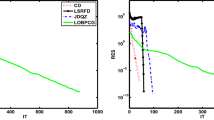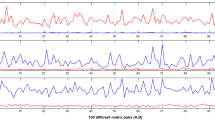Abstract
We present a Chebyshev-Davidson method to compute a few smallest positive eigenvalues and corresponding eigenvectors of linear response eigenvalue problems. The method is applicable to more general linear response eigenvalue problems where some purely imaginary eigenvalues may exist. For the Chebyshev filter, a tight upper bound is obtained by a computable bound estimator that is provably correct under a reasonable condition. When the condition fails, the estimated upper bound may not be a true one. To overcome that, we develop an adaptive strategy for updating the estimated upper bound to guarantee the effectiveness of our new Chebyshev-Davidson method. We also obtain an estimate of the rate of convergence for the Ritz values by our algorithm. Finally, we present numerical results to demonstrate the performance of the proposed Chebyshev-Davidson method.
Similar content being viewed by others
References
Anderson, C.R.: A Rayleigh-Chebyshev procedure for finding the smallest eigenvalues and associated eigenvectors of large sparse Hermitian matrices. J. Comput. Phys. 229(19), 7477–7487 (2010)
Bai, Z., Li, R.C.: Minimization principle for linear response eigenvalue problem, I theory. SIAM J. Matrix Anal. Appl. 33(4), 1075–1100 (2012)
Bai, Z., Li, R.C.: Minimization principles for the linear response eigenvalue problem II Computation. SIAM J. Matrix Anal. Appl. 34(2), 392–416 (2013)
Banerjee, A.S., Elliott, R.S., James, R.D.: A spectral scheme for Kohn-Sham density functional theory of clusters. J. Comput. Phys. 287, 226–253 (2015)
Cao, Z. -H., Xie, J. -J., Li, R. -C.: A sharp version of Kahan’s theorem on clustered eigenvalues. Linear Algebra Appl. 245, 147–155 (1996)
Cheney, E.W.: Introduction to approximation theory, 2nd edn. Chelsea Publishing Company, New York (1982)
Davis, T., Hu, Y.: The university of florida sparse matrix collection. ACM t. Math. Softw 38(1), 1:1–1:25 (2011)
Demmel, J.W.: Applied numerical linear algebra. SIAM (1997)
Giannozzi, P., Baroni, S., Bonini, N., Calandra, M., Car, R., Cavazzoni, C., Ceresoli, D., Chiarotti, G. L., Cococcioni, M., Dabo, I., et al.: QUANTUM ESPRESSO: a modular and open-source software project for quantum simulations of materials. J. Phys. Condens. Matter 21(39), 395502 (2009)
Knyazev, A.V.: Convergence rate estimates for iterative methods for a mesh symmetric eigenvalue problem. Soviet J. Numer. Anal. Math. Modelling 2(5), 371–396 (1987)
Levitt, A., Torrent, M.: Parallel eigensolvers in plane-wave density functional theory. Comp. Phys. Comm. 187, 98–105 (2015)
Morgan, R.B.: GMRESwith deflated restarting. SIAMJ Sci. Comput. 24(1), 20–37 (2002)
Motamarri, P., Gavini, V.: A subquadratic-scaling subspace projection method for large-scale Kohn-Sham density functional theory calculations using spectral finite-element discretization. Phys. Rev. B 90, 115127 (2014)
Oliveira, S.: On the convergence rate of a preconditioned subspace eigensolver. Computing 63(3), 219–231 (1999)
Ovthinnikov, E.: Convergence estimates for the generalized Davidson method for symmetric eigenvalue problems I: the preconditioning aspect. SIAM J. Numer. Anal. 41(1), 258–271 (2003)
Ovthinnikov, E.: Convergence estimates for the generalized Davidson method for symmetric eigenvalue problems II: the subspace acceleration. SIAM J. Numer. Anal. 41(1), 272–286 (2003)
Papakonstantinou, P.: Reduction of the RPA eigenvalue problem and a generalized Cholesky decomposition for real-symmetric matrices. EPL (Europhysics Letters) 78 (1), 12001 (2007)
Parlett, B.N.: The symmetric eigenvalue problem. Number 20 in classics in applied mathematics. SIAM, Philadelphia (1998)
Rocca, D.: Time-dependent density functional perturbation theory: new algorithms with applications to molecular spectra. PhD thesis, The International School for Advanced Studies, Trieste (2007)
Rocca, D., Bai, Z., Li, R. -C., Galli, G.: A block variational procedure for the iterative diagonalization of non-Hermitian random-phase approximation matrices. J. Chem. Phys. 136, 034111 (2012)
Saad, Y.: Numerical methods for large eigenvalue problems. Wiley (1992)
Stewart, G.W.: Matrix algorithms, volume II: eigensystems. SIAM, Philadephia (2001)
Teng, Z., Li, R.-C.: Convergence analysis of Lanczos-type methods for the linear response eigenvalue problem. J. Comput. Appl. Math. 247, 17–33 (2013)
Teter, M.P., Payne, M.C., Allan, D.C.: Solution of Schrödinger’s equation for large systems. Phys. Rev. B 40(18), 12255–12263 (1989)
Thouless, D.J.: Vibrational states of nuclei in the random phase approximation. Nucl. Phys. 22(1), 78–95 (1961)
Thouless, D.J.: The quantum mechanics of Many-Body systems. Academic (1972)
Tsiper, E.V.: A classical mechanics technique for quantum linear response. J. Phys. B Atomic Mol. Phys. 34(12), L401–L407 (2001)
Yamazaki, I., Bai, Z.J., Simon, H., Wang, L.W., Wu, K.S.: Adaptive projection subspace dimension for the thick-restart Lanczos method. ACM T. Math Software 37(3), 27:1–27:18 (2010)
Zhang, L.-H., Lin, W.-W., Li, R.-C.: Backward perturbation analysis and residual-based error bounds for the linear response eigenvalue problem. BIT Numer. Math. 55(3), 869–896 (2015)
Zhou, Y.: A block Chebyshev-Davidson method with inner-outer restart for large eigenvalue problems. J. Comput. Phys. 229(24), 9188–9200 (2010)
Zhou, Y., Chelikowsky, J.R., Saad, Y.: Chebyshev-filtered subspace iteration method free of sparse diagonalization for solving the Kohn-Sham equation. J. Comput. Phys. 274, 770–782 (2014)
Zhou, Y., Li, R. -C.: Bounding the spectrum of large Hermitian matrices. Linear Algebra Appl. 435(3), 480–493 (2011)
Zhou, Y., Saad, Y.: A Chebyshev-Davidson algorithm for large symmetric eigenproblems. SIAM J Matrix Anal. Appl. 29(3), 954–971 (2007)
Zhou, Y., Saad, Y., Tiago, M. L., Chelikowsky, J. R.: Parallel self-consistent-field calculations using Chebyshev-filtered subspace acceleration. Phys. Rev. E. 74(6), 066704 (2006)
Author information
Authors and Affiliations
Corresponding author
Additional information
Communicated by: Carlos Garcia - Cervera
Zhongming Teng was supported in part by China Scholarship Council and Natural Science Foundation of Fujian province No. 2015J01580. Part of this work was done while this author was a visiting student at Department of Mathematics, University of Texas at Arlington.
Yunkai Zhou was supported in part by the National Science Foundation grants DMS-1228271 and DMS-1522587.
Ren-Cang Li was supported in part by the National Science Foundation grants DMS-1317330 and CCF-1527104, NSFC grant 11428104.
Rights and permissions
About this article
Cite this article
Teng, Z., Zhou, Y. & Li, RC. A block Chebyshev-Davidson method for linear response eigenvalue problems. Adv Comput Math 42, 1103–1128 (2016). https://doi.org/10.1007/s10444-016-9455-2
Received:
Accepted:
Published:
Issue Date:
DOI: https://doi.org/10.1007/s10444-016-9455-2
Keywords
- Eigenvalue/eigenvector
- Chebyshev polynomial
- Davidson type method
- Convergence rate
- Linear response
- Upper bound estimator




